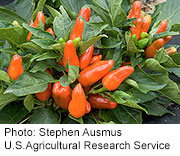Cases with gallbladder cancer more likely to have detectable AFB1 adducts than controls
WEDNESDAY, May 27, 2015 (HealthDay News) — Gallbladder cancer seems to be associated with aflatoxin, according to a study published in the May 26 issue of the Journal of the American Medical Association.
Leticia Nogueira, M.P.H., Ph.D., from the National Cancer Institute in Rockville, Md., and colleagues recruited incident gallbladder cancer cases (36 participants), controls with gallstones (29 participants), and community cancer-free controls (47 participants) to examine the correlation between aflatoxin and gallbladder cancer. The participants were selected from several hospitals and communities in Chile, where aflatoxin contamination has been identified in ají rojo (red chili peppers). Aflatoxin B1-lysine adduct (AFB1 adduct) detection and level were assessed using isotope dilution mass spectrometry. Ají rojo consumption was assessed by questionnaire.
The researchers found that consumption of ají rojo paste was significantly higher among cancer cases (47.2 percent) versus gallstone and community controls (17.9 and 19.1 percent, respectively; P = 0.009). They detected AFB1 adducts in 64 percent of cases, 18 percent of controls with gallstones, and 23 percent of community controls. Cases had highest levels of AFB1 adducts (median, 7.6 pg/mg) and were more likely to have detectable AFB1 adducts than gallstone or community controls (odds ratios, 9.4 and 13.2, respectively). Among participants with AFB1 adducts, higher levels per change of 10 pg/mg of albumin were seen for cancer cases versus gallstone or community controls (odds ratios, 4.0 and 2.5, respectively).
“Despite the small number of participants, the associations between aflatoxin exposure and gallbladder cancer were statistically significant,” the authors write. “These findings, if confirmed, may have implications for cancer prevention.”
Full Text (subscription or payment may be required)
Copyright © 2015 HealthDay. All rights reserved.








